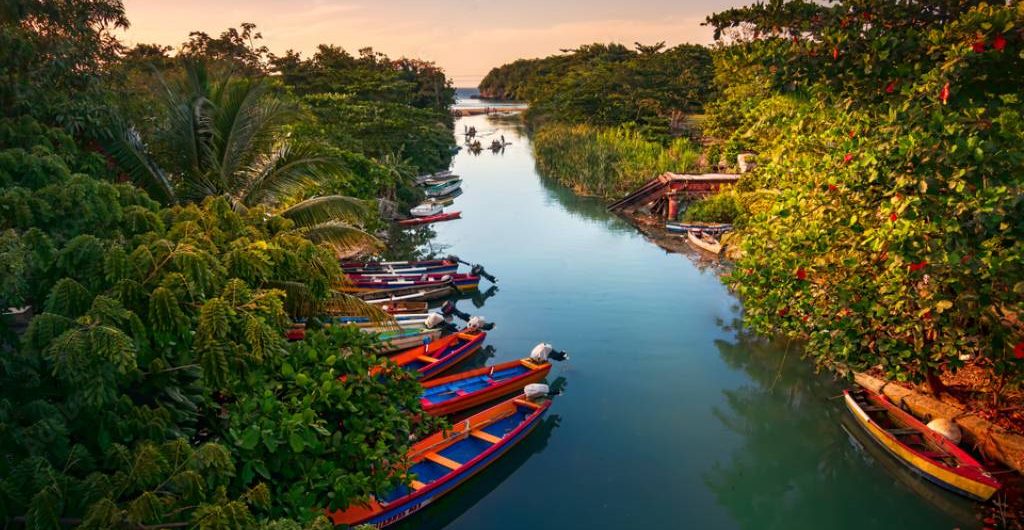
Jamaica, located in the Caribbean Sea, is an island nation known for its stunning natural beauty, vibrant culture, and rich history. Its capital city is Kingston, which is not only the largest city but also the cultural and economic hub of the country.
Geography of Jamaica

Land Area: Jamaica covers an area of approximately 4,240 square miles, making it the third-largest island in the Caribbean.
Terrain: The island is characterized by diverse terrain, including lush rainforests, picturesque mountains, and beautiful coastlines with sandy beaches.
Climate: Jamaica enjoys a tropical climate with warm temperatures year-round. It’s prone to hurricanes during the hurricane season, which runs from June to November.
History of Jamaica
Indigenous Peoples: Before European colonization, Jamaica was inhabited by indigenous peoples, primarily the Arawakan-speaking Taíno people.
Spanish Colonization: Christopher Columbus arrived in Jamaica in 1494, and the island became a Spanish colony. However, due to British conquests, it later fell under British rule.
British Rule: Jamaica was a British colony from 1655 until it gained full independence in 1962.
Independence: Jamaica became an independent nation on August 6, 1962, and remains a member of the Commonwealth of Nations.
Government and Politics
Government Type: Jamaica is a parliamentary democracy with a constitutional monarchy. The British monarch serves as the ceremonial head of state, while the Prime Minister is the head of government.
Head of State: As of my last knowledge update in September 2021, Queen Elizabeth II was the monarch. However, please verify the current head of state.
Political Parties: Jamaica has a multi-party system, with the two main political parties being the Jamaica Labour Party (JLP) and the People’s National Party (PNP).
Economy of Jamaica
Major Industries: Jamaica’s economy relies on various industries, including tourism, agriculture, mining, and manufacturing.
Agriculture: Key agricultural products include sugarcane, coffee, cocoa, and bananas.
Tourism: Tourism is a significant driver of the economy, with visitors attracted to the island’s beaches, resorts, and cultural attractions.
Culture and Society
Language: English is the official language, but Jamaican Patois (Jamaican Creole) is widely spoken.
Religion: Christianity, primarily Protestantism and Rastafarianism, is the dominant religion in Jamaica.
Music and Dance: Jamaica is famous for reggae music, and artists like Bob Marley have achieved international acclaim. The island is also known for dancehall music and various dance styles.
Cuisine: Jamaican cuisine features spicy flavors and includes dishes like jerk chicken, ackee and saltfish, and patties.
Holidays and Festivals: Jamaica celebrates various holidays and festivals, including Independence Day, Carnival, and Emancipation Day.
Landmarks and Tourist Attractions
Beaches: Jamaica boasts beautiful beaches, such as Seven Mile Beach in Negril and Doctor’s Cave Beach in Montego Bay.
Historical Sites: Visitors can explore historical sites like Port Royal, a former pirate haven, and Spanish Town, the old Spanish capital.
Natural Wonders: The Blue Mountains offer hiking and coffee plantation tours, and Dunn’s River Falls is a popular waterfall attraction.
Demographics: Jamaica is a diverse nation with a population of over 2.9 million people.
Traditions and Customs: Jamaicans have a rich cultural heritage with traditions influenced by African, European, and indigenous roots.
National Symbols: The national flag, the Coat of Arms, and the national anthem are significant symbols of Jamaican identity.
Challenges and Issues
Poverty and Inequality: Jamaica faces challenges related to poverty and income inequality, particularly in rural areas.
Environmental Concerns: Environmental issues include deforestation, coral reef degradation, and vulnerability to hurricanes.
Crime and Security: High crime rates, especially in urban areas, have been a concern for
Jamaica.
Future Outlook
Economic Development: The government is focused on economic diversification and sustainable development to improve the standard of living.
Social Progress: Efforts are underway to address social issues, improve education, and provide better healthcare.
Environmental Sustainability: Initiatives are being implemented to protect Jamaica’s natural resources and combat climate change.